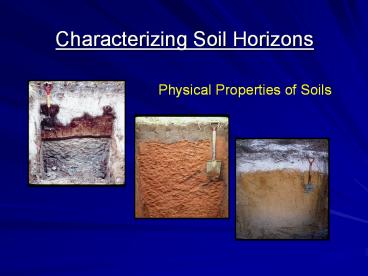Characterizing Soil Horizons - PowerPoint PPT Presentation
Title:
Characterizing Soil Horizons
Description:
Therefore the hydrometer directly measures the density of the material in the suspension. The units are g/L. Show with cylinder supplied. – PowerPoint PPT presentation
Number of Views:285
Avg rating:3.0/5.0
Title: Characterizing Soil Horizons
1
Characterizing Soil Horizons
Physical Properties of Soils
2
Idealized Surface Soil
Voids
Solids
Avenues Storage Distribution Movement
Interactive Media Minerals Organic
matter Reactivity
3
Parent Material to Soil
Differentiation
Parent Material
Additions
Losses
Translocations
Transformations
Bedrock
4
Soil Horizons
Roughly parallel layers in the soil with varying
composition and properties
5
Criteria for Characterizing Soil Horizons
- Color
- Texture
- Density
- Structure
- Organic matter
- Mineralogy
- Chemistry
6
Soil Color
Hue
dominant spectral color related to the
wavelength of light. Related to the proportions
of red to yellow.
Value
related to total amount of light reflected.
Chroma
measure of the strength of spectral color
7
Hue 10 YR Value 6 Chroma 3
Munsell Color 10 YR 6/3
8
Physical Criteria for Delineating Horizons
- Color
- Texture
- Structure
- Density
9
The Soil Mineral Component Texture
the size of soil particles
10
Soil texture refers to the relative amounts of
three distinct size separates comprising the soil
mineral component.
Sizes classes of particles
Sand Silt Clay
11
Soil Texture
Diameter
Dominant Minerals
Class
Sand (2.0 0.05 mm) Quartz Silt (0.05
0.002 mm) Quartz /Feldspars/mica Clay (lt0.002
mm) Secondary minerals
12
(No Transcript)
13
Importance of Soil Texture
(Distribution of particle sizes)
Soil Porosity Particle Surface Area
Water/Gas Movement Reactivity
14
Soil Porosity
Porosity the total volume of soil pores - the
distribution of pore sizes
Clay
Silt
Sand
15
Texture, Pore Sizes, and Water
Large particles yield large pore spaces Small
particles yield small pore spaces
Water moves rapidly and is poorly retained in
Coarse-textured sandy soils. Water moves slowly
and is strongly retained in Fine-textured, clayey
soils.
16
Rapid
Sands
Poor Retention
Clays/iron
Slow
Water Retained
17
Surface Area and Particle Size
18
2 mm 2 mm 2 mm
Each face is 4 mm2
Each face is 1 mm2
6 faces x 4 mm2 24 mm2 6 faces
x 1mm2 x 8 cubes 48 mm2
If each of the resulting cubes was divided
similarly, the surface area would increase 16
times more
19
Surface Area
units
cm2 g
Specific Surface Area Surface Area
mass
20
Specific Surface Area
Separate SSA (cm2/g) Sand 30 Silt
1500 Clay 3,000,000
16 g of clay
21
100 g soil
Soil A
Soil B
90 g sand 5 g silt 5 g clay
95 g sand 4 g silt 1 g clay
90 g sand x 30 g/cm2 2700 cm2
95 g sand x 30 g/cm2 2850 cm2
5 g silt x 1500 g/cm2 7500 cm2
4 g silt x 1500 g/cm2 6000 cm2
5 g clay x 3 M g/cm2 15 M cm2
1 g clay x 3 M g/cm2 3 M cm2
Total 15,010,200 cm2
Total 3,008,850 cm2
22
Soil Horizons Texture Clay Content Surface
Area Potential Reactivity
23
Soil Textural Classes
24
Soil Textural Triangle
25
Florida Soils
clay
Sand lt10 Loamy sand 10 15 Sandy loam 15
20 Sandy clay loam 20 35 Sandy clay 35
55 Clay gt 50
26
70 sand, 20 silt, 10 clay
27
60 sand, 10 silt, 30 clay
28
Measuring Soil Texture
29
Texture-by-Feel
Relative amounts of 3 soil separates Sand,
Silt, and Clay
Gritty smooth plastic
30
Texture-by-Feel
Field Analysis
31
Texture by Feel
Sand Gritty Silt Smooth Clay Sticky,
Plastic
32
Laboratory Analysis of Soil Texture
33
Laboratory Analysis
Sedimentation Sand, Silt, and Clay Fraction
drag
drag
gravity
34
Sedimentation
Sand Silt Clay
Sand Silt Clay
35
Quantifying Sedimentation Rates
36
Stokes Law
g (dp-dL) D2 18u
Velocity V(cm/s)
g gravity dp density of the particle dL
density of the liquid u viscosity of the
liquid
V D2
K 11,241 cm-1 sec-1
1 cm sec
37
Stokes Law
V K D2
K 11,241 cm-1 sec-1
Sand D 1 mm
V 11,241 x (0.1)2
112.4 cm/sec
38
Stokes Law
V K D2
K 11,241 cm-1 sec-1
clay D 0.002 mm
V 11,241 x (0.0002)2
0.00045 cm/sec
39
sand
silt
clay
40
Sedimentation
The density of a soil suspension decreases as
particles settle out.
1 minute Sand settles out 4 hours Silt settles
out
suspension
41
Hydrometer Method
Stem Scale Bulb weight
0 g/L
hydrometer
t 0 t 1 min
Pure distilled water (18o C) 0 g/L
42
Hydrometer Method
Add 40 g soil to 1 liter of water
Time 0 sec density 40 g/L
Time 1 min. density 10 g/L
Sand settled 40 g 10 g 30 g
43
Hydrometer Method
Time 4 hrs density 4 g/L
What is being measured?
Clay content 4 g
Silt 100 - (75 10)
100 - 85 15
44
Hydrometer Method
Sand 75 Silt 15 Clay 10
Sandy Loam
45
Reactivity, Water Movement
46
Next Density, Structure, Porosity































